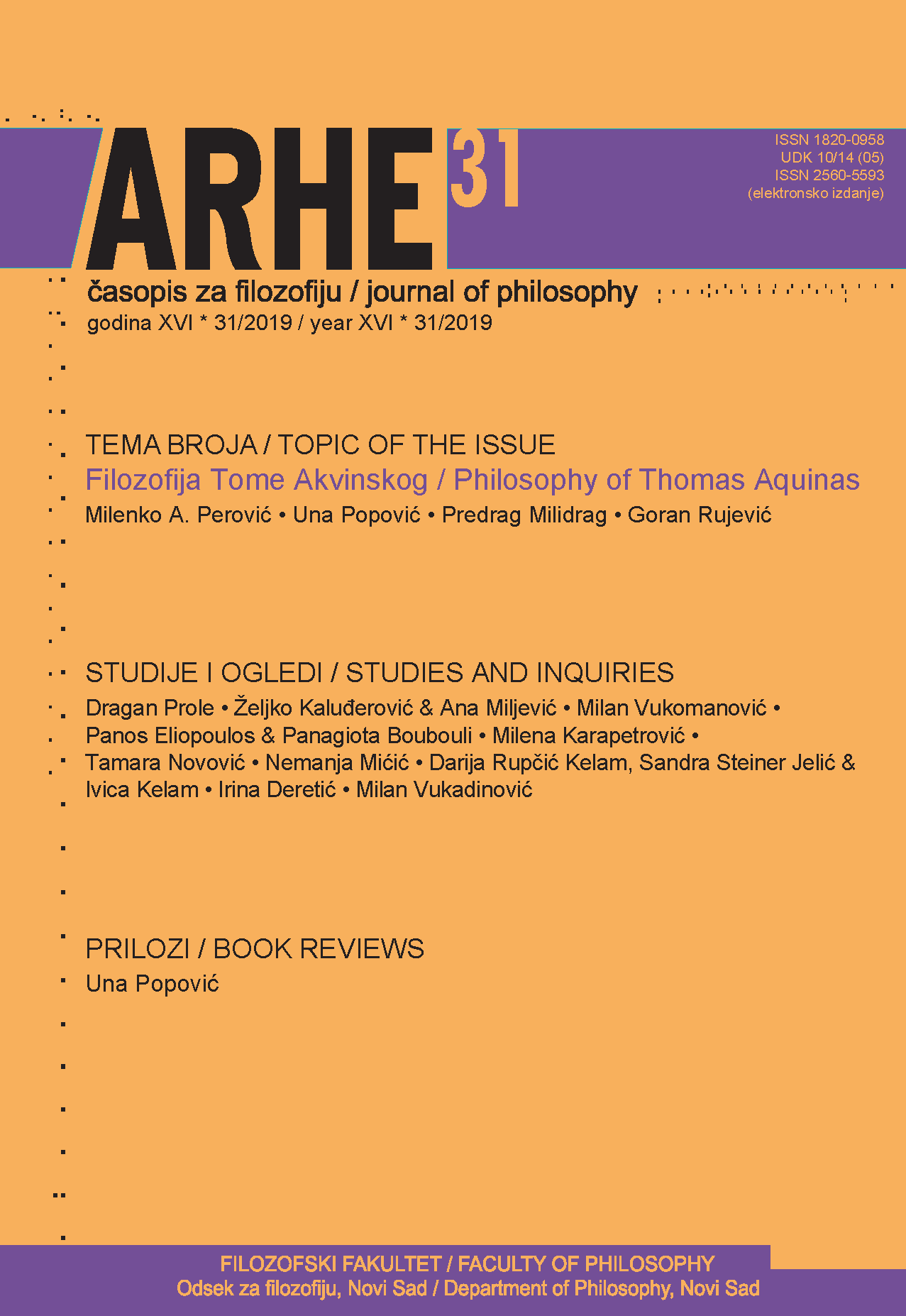THE STAGIRITE, THE ERESIAN AND NON-HUMAN LIVING BEINGS
Main Article Content
Abstract
The first part of the article analyzes Aristotle's treatment of animals and the research of the authors focuses on three issues: the presence of logos in animals, if animals can act voluntarily and if animals are responsible for what they do. Stagirites' general standing point is that animals do not have beliefs, opinions, discernment, thinking, understanding and reason. By studying his volumes it has been determined, subsequently, that animals can act voluntarily. Resolution to the dilemma whether animals are responsible for what they do depends on the understanding of Aristotle's concept of responsibility. If responsibility is understood as regulating all of those activities which were undertaken on purpose i.e. voluntarily, animals can be considered responsible. On the other hand, if the scope of responsibility is limited to the moral evaluation of acts, including the activity of logos, animals will be excluded from thus understood concept of responsibility. The authors have, following in Stagirites' footsteps, concluded that since animals can have phantasia that what they do is right or wrong, they should be either rewarded or punished for their acts. The second part of the article examines the Theophrastus' work entitled On Piety which reports not only on his opposition to sacrificing animals, but also his non-acceptance, moreover, condemning the consumption of meat, i.e. the linking of these two acts while pointing out their interdependence. The most important Eresian's philosophical contribution is reflected in the thesis that animals are intrinsically related to humans, so that due to the substantive nature it is unfair to kill them. People and animals are, inter alia, interconnected by their souls. Although some living beings have more and some less perfect souls, all of them by nature have the same principles, which is evident from the resemblance of their properties, as well as from the fact that they have common primordial parents: Uranus (Heaven) and Gea (Earth). Their similarity, then, is also reflected in the aspect of desire, anger, and especially in regards to senses. Finally, contrary to Aristotle's reception of a man and his privileged status in nature, Theophrastus considered that humans and animals are also related in terms of reasoning.
Article Details
References
Anscombe, G. E. M., "Thought and Action in Aristotle. What is ‘Practical Truth’", u:R. Bambrough (ed.), New essays on PLATO and ARISTOTLE, Routledge & Kegan Paul, London and Henley 1979.
Arabatzis, G., "Animal Rights in Byzantine Thought", u: E. D. Protopapadakis (ed.), Animal Ethics Past and Present Perspectives, Logos Verlag Berlin GmbH, Berlin 2012.
Aristotel, Fizika, PAIDEIA, Beograd 2006.
Aristotel, Metafizika, PAIDEIA, Beograd 2007.
Aristotel, Nikomahova etika, Hrv. sveuč. nakl., Zagreb 1992.
Aristotel, O delovima životinja. O kretanju životinja. O hodu životinja, PAIDEIA, Beograd 2011.
Aristotel, O duši. Parva naturalia, PAIDEIA, Beograd 2012.
Aristotel, Pamćenje i sećanje, u: O duši. Parva naturalia, PAIDEIA, Beograd 2012.
Aristotel, Politika, Liber, Zagreb 1988.
Aristotel, Retorika, Naprijed, Zagreb 1989.
Aristotel, Topika. Sofistička opovrgavanja, PAIDEIA, Beograd 2008.
Aristotelis Opera, ex. rec. Immanuelis Bekkeri, ed. Acad. Regia Borrusica, I-V, Berlin 1831-1870. Novo izdanje je pripremio O. Gigon, Berlin 1970-1987. Svi Aristotelovi navodi sravnjivani su prema ovom izdanju.
Bentham, J., Introduction to the Principles of Morals and Legislation, Hafner Pub. Co., New York 1948.
Biblija, Stari zavjet, „Prva knjiga Mojsijeva”, Sv. arh. Sin. Srp. pra. crk., Beograd 2007.
Chamberlain, C., "The Meaning of Prohairesis in Aristotle's Ethics", u: Transactions of the American Philological Association (1974-), Vol. 114, (1984).
Crisp, R., "Ethics", u: D. Furley (ed.), Routledge History of Philosophy Volume II. From Aristotle to Augustine, Routledge Taylor & Francis e-Library, London and New York 2005.
Diels, H., Kranz, W., Die Fragmente der Vorsokratiker I-III, Weidmann, Zürich . Hildesheim 1985-1987.
Diels, H., Predsokratovci fragmenti I-II, Naprijed, Zagreb 1983.
Guthrie, W. K. C., A History of Greek Philosophy VI, Cambridge University Press, Cambridge 1981.
Herodot, Istorija, Dereta, Beograd 2009.
Huffman, C. A., "The Pythagorean tradition", u: A. A. Long (ed.), The Cambridge Companion to EARLY GREEK PHILOSOPHY, Cambridge University Press, Cambridge 1999.
Hughes, G. J., Aristotle on Ethics, Routledge Taylor & Francis e-Library, London and New York 2003.
Hutchinson, D. S., "Ethics", u: J. Barnes (ed.), The Cambridge Companion to ARISTOTLE, Cambridge University Press, Cambridge 1995.
Jamblih, Pitagorin život, DERETA, Beograd 2012.
Kaluđerović, Ž., Dike i dikaiosyne, Magnasken, Skopje (Severna Makedonija) 2015.
Kaluđerović, Ž., „Pitagorejska palingenesia”, u: Eidos, god. I, br. 1, Zenica 2017, str. 97-108.
Kaluđerović, Ž., „Presokratske anticipacije ne-antropocentrizma”, u: ARHE, god. XIII, br. 25, Novi Sad 2016.
Kaluđerović, Ž., Rana grčka filozofija, Hijatus, Zenica (Bosna i Hercegovina) 2017.
Kaluđerović, Ž., Stagiranin, Izdavačka knjižarnica Zorana Stojanovića, Sremski Karlovci · Novi Sad 2018.
Krznar, T., U blizini straha, Veleučilište u Karlovcu, Karlovac 2016.
Laertije, D., Životi i mišljenja istaknutih filozofa, BIGZ, Beograd 1973. Βίοι καὶ γνῶμαι τῶν ἐν φιλοσοφίᾳ εὐδοκιμησάντων. Интернет адреса: http://www.mikrosapoplous.gr/dl/dl.html.
Makintajer, A., Traganje za vrlinom, ΠΛΑΤΩ, Beograd 2006.
Perović, M. A., Filozofija morala, Cenzura, Novi Sad 2013.
Platon, Država, BIGZ, Beograd 1993.
Platon, Ijon.Gozba.Fedar, Kultura, Beograd 1955.
Platon, Kratil. Teetet. Sofist. Državnik, ΠΛΑΤΩ, Beograd 2000.
Platon, Protagora. Gorgija, Kultura, Beograd 1968.
Platon, Zakoni, Dereta, Beograd 2004.
Πορφύριος, Περί αποχής εμψύχων. Internet adresa: https://books.google.rs/ books?id=7CoVAAAAQAAJ&pg=PP41&lpg=PP41&dq=Porphyry+%CE%A0%CE%B5%CF%81%E1%BD%B6+%CE%B1%CF%80%CE%BF%CF%87%CE%B7%CF%82+%CE%B5%CE%BC%CF%88%CF%85%CF%87%CF%89%CE%BD&source=bl&ots=ce8hvOIVCE&sig=cQixCWAm9nL2VRrbZ8JAh7oXjsE&hl=en&sa=X#v=onepage&q=Porphyry%20%CE%A0%CE%B5%CF%81%E1%BD%B6%20%CE%B1%CF%80%CE%BF%CF%87%CE%B7%CF%82%20%CE%B5%CE%BC%CF%88%CF%85%CF%87%CF%89%CE%BD&f=false.
Reeve, C. D. C., Practices of Reason, Clarendon Press, Oxford 2002.
Singer, P., Oslobođenje životinja, Ibis grafika, Zagreb 1998.
Sorabji, R., Animal Minds & Human Morals, Cornell University Press, Ithaca, New York 1995.
Sorabji, R., "Is Theophrastus a Significant Philosopher?", u: M. van Ophuijsen, M. van Raalte (Eds.),Theophrastus: Reappraising the Sources, Transaction Publishers, New Brunswick and London 1998.
Taylor, C. C. W., Aristotle, Nicomachean Ethics Books II-IV, Clarendon Press, Oxford 2006.
Žirar, R., Nasilje i sveto, Knjiž. zajed. Novog Sada, Novi Sad 1990.
